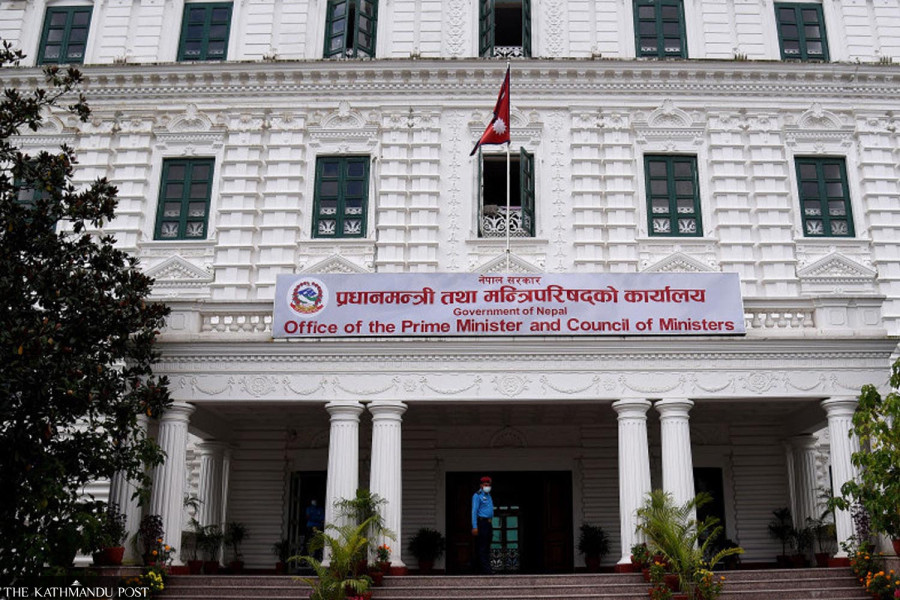National
Government backtracks on information classification
Experts say it happened just because the drafters tried to incorporate unnecessary issues instead of pinpointing certain matters or documents.
Tika R Pradhan
After severe criticism from stakeholders, the government has backtracked on its decision to classify 87 types of information to be kept secret for up to three decades.
With Monday’s decision, it has been the third time that the government has stalled the classification of information which is required for the protection of information related to Sub-section (3) of Section 3 held in a public body in the last decade or so.
Experts say it happened just because the drafters tried to incorporate unnecessary issues instead of pinpointing certain matters or documents.
The chief secretary Shanker Das Bairagi-led committee had decided to classify 87 different types of information and handed over the details of its decision to the National Information Commission (NIC) two weeks ago.
But its stakeholders, including the Federation of Nepali Journalists (FNJ), had vehemently criticised it, claiming that it would end the significance of the Right to Information Act 2007. They also demanded an immediate withdrawal of the decision.
“After the meeting today, Chief Secretary Bairagi said he would stall the classification for now,” said Bipul Pokhrel, chair of the FNJ, the umbrella organisation of all the journalists of the country. “Bairagi has told us that the information will only be classified after a thorough discussion with the stakeholders.”
After knowing of the criticism, Prime Minister Pushpa Kamal Dahal instructed the chief secretary to withdraw the decision on Sunday and therefore, Bairagi called a meeting of the stakeholders on Monday.
Section 3(3) of the RTI Act states that the information held by a public body on the following subject matters shall not be disseminated: (a) which seriously jeopardises the sovereignty, integrity, national security, public peace, stability and international relations of Nepal.
(b) which directly affects the investigation, inquiry and prosecution of a crime. (c) which seriously affects the protection of economic, trade or monetary interest or intellectual property or banking or trade privacy. (d) which directly jeopardises the harmonious relationship subsisting among various castes or communities. (e) which interferes with individual privacy and security of the body, life, property or health of a person.
The law envisions a committee led by the chief secretary to determine classified information. The committee was formed for the classification of information as per Section 27 of the RTI Act 2007 but stakeholders have criticised Bairagi for failing to reveal the experts and the secretaries involved in the classification.
Taranath Dahal, executive chairman of Freedom Forum, a civil liberty group that advocates free speech, said it was the Supreme Court order that forced the previous governments to stop the classification the last two times.
Former FNJ chairpersons, Dahal and Govinda Acharya, were also present in the meeting of the chief secretary, besides FNJ Chair Bipul Pokhrel, general secretary Roshan Puri, Press Council Nepal Chair Balkrishna Basnet and representatives of National Human Rights Commission.
“The government has realised that this sort of blanket classification could be detrimental to people’s right to information, a move we welcome,” Dahal, who was present in the discussions with government secretaries, told the Post. “After two hours of discussions, the secretaries have agreed to withdraw their decision and start afresh.”
During the meeting, the chief secretary tried to defend the move, saying government officials have been facing lots of difficulties due to the RTI Act since a large number of people have come up demanding information, thus affecting their work.
Another participant at the meeting said that the decision to classify information in a vague and blanket manner without even the knowledge of the prime minister could well be a ploy to defame the new government.
“The Prime Minister has strictly instructed the chief secretary to withdraw the classification of the information,” said Surya Kiran Sharma, press coordinator to the prime minister. “After discussions with the stakeholders, the government has decided to stall its decision and it won’t be implemented now.”




 9.6°C Kathmandu
9.6°C Kathmandu














